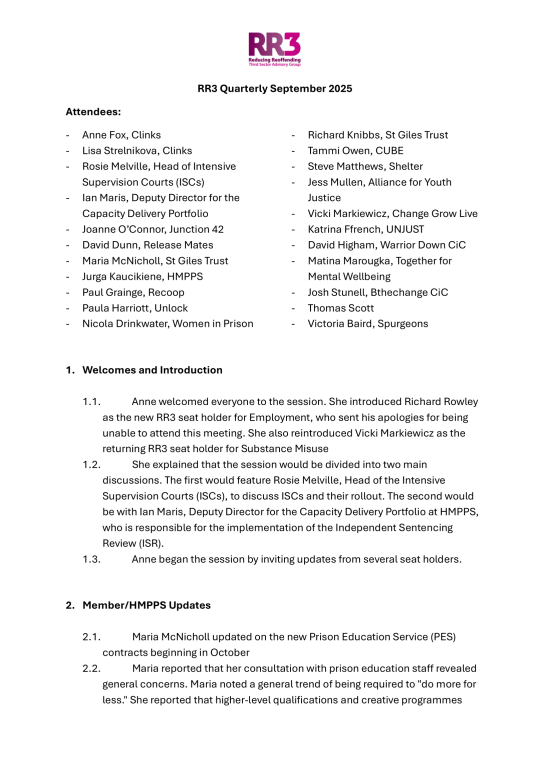I attended an interesting event last week of the Learning Disability and Criminal Justice Group in Gloucester launching Easy Read information for offenders. It was organised jointly by 2gether, the NHS mental health trust in Gloucestershire, and Mencap which runs the Raising Your Game project on learning and communication difficulties and criminal justice (of which more later).
One of the key things I learnt from the event was the problem with labels. Many people with learning or communication difficulties have had to spend years hiding them to avoid stigma, shame, discrimination or abuse. This was a clear message from Lee, an ex-prisoner with learning difficulties who shared his experience in a short film screened at the event. He described a childhood of abuse, sadly typical of many young offenders, that led him to be as he described a very angry young man. When he was arrested he ‘said no to everything so they didn’t think I was weak’. He refused a solicitor and said no when asked if he had a learning disability. When he was later sent to prison, he didn’t disclose his learning disability there either. The consequences of not knowing about and accommodating a person’s learning disabilities can be very severe. Lee breached his bail conditions because he was unable to tell the time and also didn’t understand the conditions properly, so he was imprisoned after being found in an area he was not supposed to be in. Had his learning disability been taken into account he could have been given more appropriate bail conditions or given the information and support he needed to be able to meet them.
So what is being done to address these problems? Gloucester prison asks several different questions of people on entry to prison to identify learning disabilities. These include: ‘is there someone who helps you with your budgeting?’, ‘did you get any extra help at school?’, etc. They also ask a series of questions of the prison staff who are dealing with the prisoner, such as whether the person could understand what was being said to them. This is crucial to stress that the staff have a responsibility to proactively observe and identify needs rather than just relying on tick-box questions or self-disclosure. Of course following the recent announcement of the closure of Gloucester Prison it is particularly important that this good practice is shared widely and adopted elsewhere.
The issue with labels is also one which has been addressed by the Raising Your Game project, a partnership between Mencap, Nacro and I CAN (a charity that supports children with speech, language and communication difficulties). The project aims to improve the lives of young people from 14-25 who are at risk of offending, and works in several areas across England. Mencap found that when they approached youth offending teams to find young people to work with, they were often told ‘we don’t have any of them’. There is a tendency for people to think that ‘learning disabilities’ means Down’s Syndrome, and while of course some people with learning disabilities do have Down’s, the vast majority do not. This is one of the reasons that the Raising Your Game project focuses on learning disability and communication difficulties, because this is often a more effective way of reaching people with a wide range of issues but who face similar barriers. Raising Your Game runs courses and groups for young people at risk of offending and works across the Criminal Justice System to improve accessibility. It also produces resources such as the excellent Getting Ready for Court film, made by young people with learning and communication difficulties to explain the court process.
The event also saw the launch of a series of Easy Read guides for people on arrest and custody in a police station. They are specific to three local police stations and each includes different photographs of the various stages of arrest and detention as they happen in those custody suites. Importantly, the guides were reviewed by a group of experts with learning disability from a local service user forum, ‘For Me About Me’, to check their accessibility. The leaflets can be downloaded individually from the Gloucestershire Constabulary website forGloucester, Cheltenham and Stroud police stations.
The Gloucester Learning Disability and Criminal Justice Group is currently reviewing its progress since the 2009Bradley Review, a national independent review into people with mental health problems or learning disabilities in the Criminal Justice System. More recently last year the government committed £20 million to improving ‘liaison and diversion services’ that help to ensure that people with mental health problems or learning disabilities who come into contact with police or the courts get the support or treatment they need. A consortium of organisations including Nacro and Revolving Doors Agency has been appointed to support this work as the Offender Health Collaborative.
It is also encouraging that NOMS has recently invited voluntary organisations to apply for a grant to improve services for prisoners with learning disabilities (albeit with a very short deadline, already closed). £150,000 was available until March 2013, and a further £300,000 for the following financial year. Hopefully this will result in a good programme of activities to improve screening and support for prisoners with learning disabilities. However given that around one third of prisoners have a learning disability (25,000 people) and more have difficulties with communication, it’s clear that much more will need to be done.
What can you do?
- Check if the Raising Your Game project works in your area and if so refer any young people with learning/communications difficulties to the project for info, courses and other support.
- Educate yourself on issues facing people with learning disabilities by reading the Bradley Review report published by government in 2009, and No-One Knows by Prison Reform Trust and subscribing to the Raising Your Game project newsletter.
- Review your own services to make sure that what you do is as accessible as possible to anyone who has literacy, learning or communication difficulties. Raising Your Game offers training for criminal justice staff.
- Contact your prison, mental health trust and police to find out what they are doing to improve accessibility and support for people with learning disabilities in the Criminal Justice System, and what they’re doing to help divert people out of the system.
Share your experience here…
- Do you have experience of a learning or communication difficulty and been in contact with the Criminal Justice System?
- How does your organisation work with offenders with learning disabilities or communication difficulties?
- What needs to improve in the Criminal Justice System to support them better?
- What can Voluntary and Community Sector organisations do about it?
What's new
Blogs
Violence Against Women and Girls (VAWG) Strategy Blog
Publications
Latest on X
The role is for a leader from an organisation focused on racially minoritised people, with expertise in service delivery, policy, advocacy, or related areas in criminal justice. Racial disparities are present at every CJS stage. This role ensures these voices are central in shaping policy to help address and eradicate them. Apply by Mon 18 Nov, 10am. More info: https://www.clinks.org/voluntary-community-sector/vacancies/15566 #CriminalJustice #RR3 #RacialEquity

